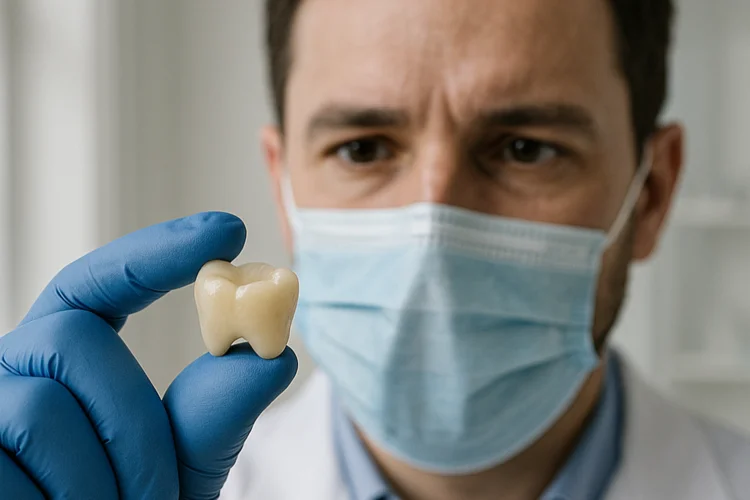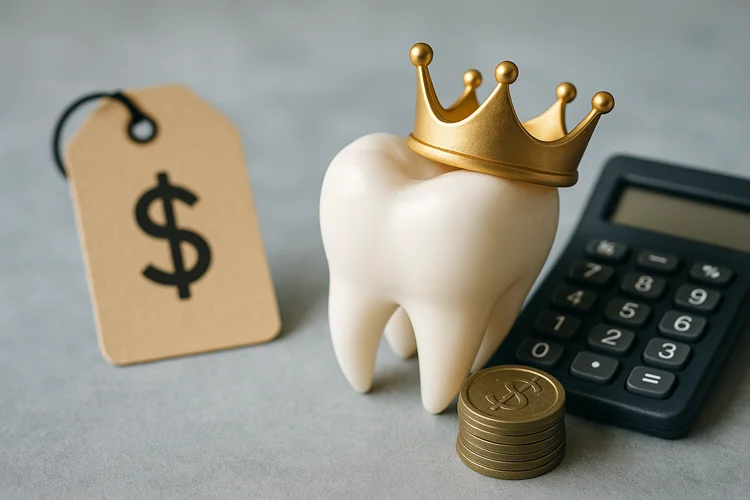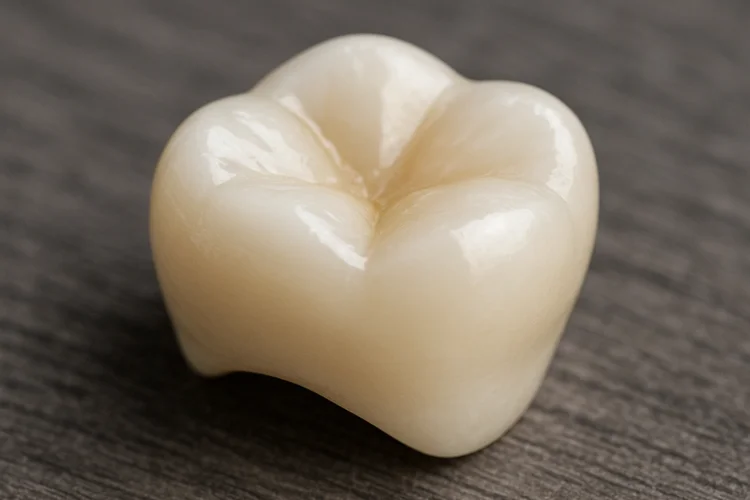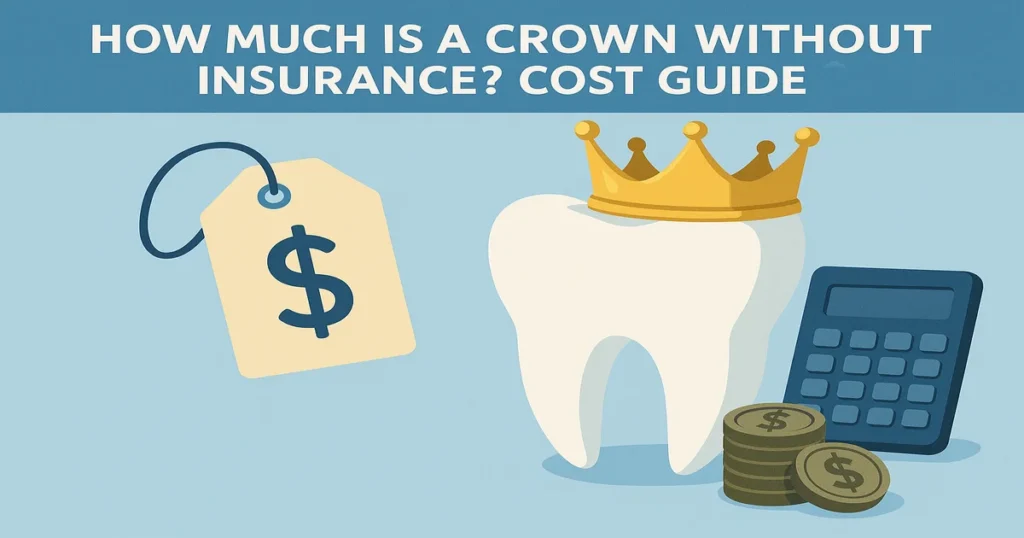The cost of a dental crown without insurance can vary widely, and for many patients, that uncertainty is stressful. In 2025, prices for dental crowns in Canada reflect several factors, including materials, preparation needs, and your dentist’s expertise.
Suppose you’re considering a crown to restore a damaged or decayed tooth. In that case, this guide will give you a realistic understanding of what to expect, what influences pricing, and how to budget wisely for your procedure.

What Is a Dental Crown and Why Does Cost Matter
A dental crown is a permanent cap placed over a tooth to restore its shape, strength, and appearance after significant damage or decay. It’s a long-term investment in both function and aesthetics, one that can prevent future complications and improve your oral health.
Function of a Crown and Typical Use-Cases
Crowns are commonly recommended after root canal treatments, large fillings, or severe fractures. They can also be used for cosmetic dentistry, for example, to improve the shape or colour of a tooth, and to support dental bridges or restore dental implants. The right crown protects your tooth from further damage and ensures proper bite alignment.
Why Costs Without Insurance Tend to Be Higher
Without dental insurance, patients are responsible for the entire procedure cost, including material fees, lab fabrication, and chair time. Insurance often covers a portion of major restorative services, but uninsured patients must plan for full payment upfront. Understanding each cost component helps avoid surprises and ensures you can make informed decisions about both quality and affordability.

Typical Cost Ranges in Canada for 2025 Without Insurance
While crown prices vary by region and clinic, the following table outlines the average out-of-pocket costs across Canada in 2025.
| Crown Material | Average Cost (CAD) | Durability / Use Case |
|---|---|---|
| Porcelain-fused-to-metal (PFM) | $900 – $1,400 | Strong, natural appearance, suitable for molars |
| Full Porcelain / Ceramic | $1,000 – $1,600 | Best aesthetics, ideal for front teeth |
| Zirconia | $1,200 – $1,800 | Extremely durable, stain-resistant |
| Gold or Metal Alloy | $1,200 – $2,000 | Long-lasting, gentle on opposing teeth |
| Temporary Resin Crown | $250 – $500 | Short-term use, emergency or interim restoration |
These figures apply to standard single-tooth crowns and do not include additional treatments like root canals or tooth buildups that may be necessary beforehand.
Read more: Root Canal Cost Explained: Factors, Insurance, and Financing
Key Factors That Affect the Cost
Several key elements influence how much a dental crown costs without insurance:
- Material Choice: Porcelain and zirconia crowns are more expensive due to their strength and lifelike appearance, while metal crowns are valued for longevity.
- Tooth Location: Molars typically cost more to restore because they require stronger materials and more complex shaping.
- Preparation Work: Procedures like root canal therapy or tooth buildup increase the total cost.
- Lab and Fabrication Fees: Custom shading and digital milling add to the expense but ensure better aesthetics and fit.
- Dentist’s Experience: Highly skilled dentists who use advanced technology may charge higher fees but deliver superior precision and results.
- Geographic Region: Costs in metropolitan areas like Vancouver or Surrey are often higher due to overhead and lab fees.
The quote below might also help you: the GoodRx:
“You can save on a dental crown by comparing dental insurance plans, checking out dental savings plans, and visiting a dental school.”

Cost-Saving Strategies for Uninsured Patients
If you don’t have dental insurance, there are several practical ways to manage the cost of a crown without compromising care quality. Many clinics, including Smile Plus Dentistry, offer financing plans or flexible payment options for restorative treatments.
You can also explore:
- Preventive visits: Regular dental checkups and teeth cleaning help identify small problems early, reducing the likelihood of needing major restorations.
- Alternative materials: Discuss with your dentist whether a porcelain-fused-to-metal crown could be a suitable and more affordable option compared to a full zirconia.
- Treatment sequencing: Your dentist may prioritize the most urgent crowns first and plan others later, spreading out the cost.
- Community or government programs: Low-income patients may qualify for financial support under provincial initiatives like the BC Healthy Kids Program, which covers pediatric dentistry.
Book Your Appointment Today with Our Team!
If you’re considering a dental crown but don’t have insurance, Smile Plus Dentistry can help you plan your treatment with full cost transparency and flexible payment options. Our experienced team will assess your needs, explain every step, and ensure your crown fits comfortably and looks natural.
Get Quality Care Without Insurance for Your Dental Crown
Understanding the cost of a dental crown without insurance helps you make confident, informed decisions about your oral health. The price may seem high, but the protection and longevity it provides often outweigh the expense, especially when preventing future complications or tooth loss.
At Smile Plus Dentistry, we provide expert restorative dental care, including crowns, bridges, and cosmetic restorations, all delivered with precision and transparency. Our team prioritizes honest cost discussions and flexible solutions for every patient, insured or not. Whether you need a new crown, a root canal, or a complete smile restoration, we’re here to guide you through every step with care and clarity.
Contact Smile Plus Dentistry today to schedule a consultation and receive a personalized estimate for your dental crown treatment in Vancouver or Surrey.
FAQ
These are the most frequently asked questions about this topic:
-
Does the material of the crown make a big difference in cost?
Yes. Materials like porcelain and zirconia are more expensive but provide superior aesthetics and strength, while metal options like gold may cost slightly less but are primarily used for molars.
-
Are there extra costs beyond the crown itself that I should be aware of?
Yes. Preparatory treatments such as root canals, tooth buildups, or temporary crowns may add several hundred dollars to the total. Always ask your dentist for a full cost breakdown before treatment.
Have questions about dental crown costs or how to prepare for treatment without insurance?
Share them in the comments below,
We’d love to hear your thoughts and help you make informed decisions about your dental care.


No Comments